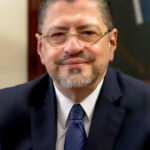Politics
Costa Rica Politics
This page explores Costa Rica‘s political structure incorporating real-time RSS feed news and videos. By harnessing the power of RSS feeds, visitors can stay informed about the latest developments in Costa Rica‘s politics as they happen. The dynamic nature of these feeds ensures that users receive up-to-the-minute updates on political events, policy changes, and significant milestones, enabling them to stay abreast of the ever-evolving political scene.

Rodrigo Chaves Robles
49th President of Costa Rica
Incumbent
Assumed office
8 May 2022
Image credit
Costa Rica operates under a presidential democratic republic political structure. The country is a republic, where the President of Costa Rica serves as both the head of state and the head of government. The President is elected by popular vote for a four-year term and can serve non-consecutive terms. The President holds significant executive powers and is responsible for leading the government, implementing policies, and representing Costa Rica domestically and internationally.
The legislative branch in Costa Rica is a unicameral legislature known as the Legislative Assembly. It consists of members who are elected through a proportional representation system. The Legislative Assembly is responsible for making laws, approving the national budget, and exercising legislative oversight over the executive branch. Costa Rica also has an independent judiciary that operates separately from the legislative and executive branches. The judiciary ensures the interpretation and application of the law, upholds justice, and protects the rights of individuals. The Supreme Court of Justice is the highest court in Costa Rica and serves as the final appellate instance.
Costa Rica’s political structure upholds democratic principles, including the separation of powers, regular elections, and protection of individual rights and freedoms. The country is known for its commitment to democracy, environmental conservation, and human rights. Costa Rica abolished its military in 1948 and has since focused on social development, education, and environmental sustainability. The political system in Costa Rica provides a framework for democratic governance, checks and balances, and respect for human rights.
Unless other sources are listed, original content is provided by ChatGPT. ChatGPT may produce inaccurate information about people, places, or facts. #CostaRica #CostaRicaPolitics #CostaRicaNews #CostaRicaNewsToday #CostaRicaRSSFeed #BlahFace



